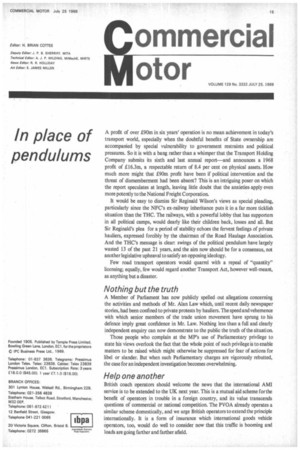ommercial otor
Page 17

If you've noticed an error in this article please click here to report it so we can fix it.
A profit of over £90m in six years' operation is no mean achievement in today's transport world, especially when the doubtful benefits of State ownership are accompanied by special vulnerability to government restraints and political pressures. So it is with a bang rather than a whimper that the Transport Holding Company submits its sixth and last annual report—and announces a 1968 profit of £16.3m, a respectable return of 8.4 per cent on physical assets. How much more might that £90m profit have been if political intervention and the threat of dismemberment had been absent? This is an intriguing poser on which the report speculates at length, leaving little doubt that the anxieties apply even more potently to the National Freight Corporation.
It would be easy to dismiss Sir Reginald Wilson's views as special pleading, particularly since the NFC's ex-railway inheritance puts it in a far more ticklish situation than the THC. The railways, with a powerful lobby that has supporters in all political camps, would dearly like their children back, losses and all. But Sir Reginald's plea for a period of stability echoes the fervent feelings of private hauliers, expressed forcibly by the chairman of the Road Haulage Association. And the THC's message is cleac swings of the political pendulum have largely wasted 13 of the past 21 years, and the aim now should be for a consensus, not another legislative upheaval to satisfy an opposing ideology.
Few road transport operators would quarrel with a repeal of "quantity" licensing; equally, few would regard another Transport Act, however well-meant, as anything but a disaster.
Nothing but the truth
A Member of Parliament has now publicly spelled out allegations concerning the activities and methods of Mr. Alan Law which, until recent daily newspaper stories, had been confined to private protests by hauliers. The speed and vehemence with which senior members of the trade union movement have sprung to his defence imply great confidence in Mr. Law. Nothing less than a full and clearly independent enquiry can now demonstrate to the public the truth of the situation.
Those people who complain at the MP's use of Parliamentary privilege to state his views overlook the fact that the whole point of such privilege is to enable matters to be raised which might otherwise be suppressed for fear of actions for libel or slander. But when such Parliamentary charges are vigorously rebutted, the case for an independent investigation becomes overwhelming.
Help one another
British coach operators should welcome the news that the international AMI service is to be extended to the UK next year. This is a mutual aid scheme for the benefit of operators in trouble in a foreign country, and its value transcends questions of commercial or national competition. The PV0A already operates a similar scheme domestically, and we urge British operators to extend the principle internationally. It is a form of insurance which international goods vehicle operators, too, would do well to consider now that this traffic is booming and loads are going farther and farther afield.
















































































































